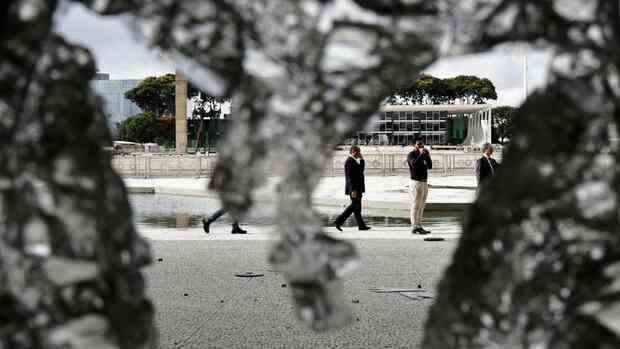The parallels are as astounding as they are frightening: a president who has been voted out of office and has never taken basic democratic values so seriously incites his base to attack the constitutional organs of the state. At first glance, the institutions seem so overwhelmed that one could get the impression, indeed must, that the state is all too carelessly giving up its monopoly on the use of force. And above all: the dwindling trust in the democratic process that such images inevitably bring with them.
Almost to the day in Brazil, what happened in the USA on January 6 two years ago, and undoubtedly went down in the history of the proud American democracy as a portent, is being repeated almost to the day: the storming of the Capitol in Washington.
So now Brazil – after all, with its 215 million inhabitants, it is by far the largest democracy in Latin America. Like Donald Trump at the time, ex-President Jair Bolsonaro, who is now in Florida, made every effort to deny the legitimacy of his elected successor, Lula da Silva.
The outbreaks of violence as such are not really surprising. The amazing thing was that the initial transfer of power seemed to go so smoothly at first. After all, Lula had narrowly defeated Bolsonaro a good two months ago with just two million votes – and like Trump, Bolsonaro had never admitted his defeat.
Top jobs of the day
Find the best jobs now and
be notified by email.
Surprising – and above all threatening – is the fact that the police forces apparently not only tolerated the attacks on parliament, the seat of government and the Supreme Court in Brasilia in part, but even cooperated with the insurgents.
The mere fact that there is a public debate in Brazil about the position of the military shows how fragile the situation is. In addition, Latin American history is rich in military coups.
A peaceful transfer of power is the essence of any democracy. And the latest events in Brazil show once again that the greatest threat to free societies does not come from the world’s up-and-coming autocrats – be they Xi Jinping, Vladimir Putin or Recep Tayyip Erdoğan. The greatest threat to democracies comes from within.
Supporters of former President Bolsonaro storm several state facilities.
(Photo: dpa)
The susceptibility to populist seducers has not diminished since the vote of the greatest of all simplifiers, who resided in the Washington White House for four years.
Like his role model Trump, Bolsonaro pretended to act on behalf of a silent majority. As with Trump, with Bolsonaro the boundaries between fiction and truth became so blurred that a constructive public discourse was hardly possible. And like Trump, Bolsonaro discredited any criticism of himself or his policies during his tenure as the political establishment’s elitist clinging to the deselected status quo.
>> Read also: Storming of government quarters – President Lula distrusts the military
But anyone who believes they can sense the will of the people no longer needs parliaments to govern, and in the next step may not even need confirmation by an election.
In democracies, it also depends on the loser. Democracy is the only form of government in which citizens can elect an incompetent political leader. Provided the loser accepts this vote.
Events like those in Brasilia or two years ago in Washington are a celebration for the autocratic prophets of the supposed decline of the West. In fact, democratic systems will only survive in conflict with authoritarian rivals if they not only fight for their own values and principles, but actually live them.
The irony of history: while many Western democracies seem to be doing everything they can to weaken their own system – for example through such erratic concepts of an “illiberal democracy” as Viktor Orban advocates, which has been confirmed by voters several times and is also acceptable abroad with alarming success people in the Ukraine, in Iran and also in China are risking their lives to fight for at least a piece of freedom.
At the latest the pictures from Brasilia should show what is at stake. They should show how important the forces of resistance against authoritarian seduction are not only in dictatorships themselves, but also in open societies. Last but not least, they should remind us that more self-reflection is indispensable for the often self-righteous representatives of the West.
The example of Brazil once again clearly shows that the conflict between freedom and authoritarianism is increasingly being fought within democratic societies.
It has always been a Western illusion to believe that freedom, progress and rationality as the basis of civilization are constants in post-Enlightenment history. Just as it was an illusion to believe that Western liberalism only needed to be properly marketed in order for it to herald the “end of history”.
More: Before the runoff – Brazil remains under the spell of right-wing populists
